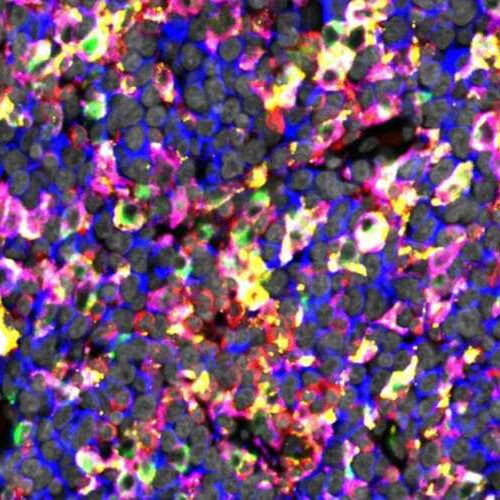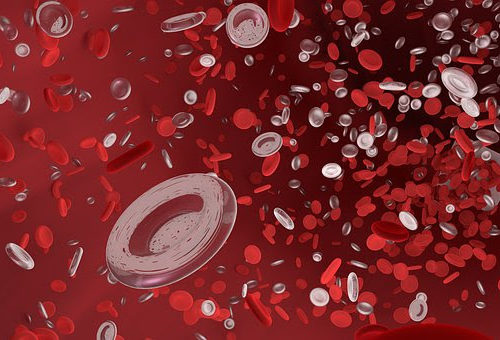by Washington University School of Medicine Researchers at WashU Medicine have reduced scar formation and improved heart function in mouse models of heart failure using a monoclonal antibody treatment. Untreated mice develop major scarring after cardiac injury (purple tissue, left) while treated animals show much less scarring (right). The findings point to the possibility of developing...
Category: <span>Immunotherapy</span>
Immunotherapy boosts survival of advanced Hodgkin lymphoma in clinical trial
Credit: CC0 Public Domain A treatment that rallies the immune system to destroy cancer raised the survival rate for advanced Hodgkin lymphoma patients to a remarkable 92%, suggesting a new standard therapy for the disease. The New England Journal of Medicine published the innovative clinical trial results. Young people are most at risk of getting Hodgkin lymphoma,...
Disrupting Asxl1 gene prevents T-cell exhaustion to improve immunotherapy, researchers discover
Core epigenetic regulators in maintaining therapeutic durable multipotent Tpex populations. Credit: Science (2024). DOI: 10.1126/science.adl4492 Immunotherapy, using a patient’s own immune system to treat disease, has shown promise in some patients with cancer but has not worked in most. New research from St. Jude Children’s Research Hospital and colleagues has found that disrupting Asxl1, a gene in...
Propelled by mechanistic insights, cancer immunotherapy breaks new ground
A better understanding of clinical outcomes, tumour dynamics and immune system interactions could lead to better outcomes. Produced by CAR-T-cell therapies have delivered transformative benefits for many cancer patients, but some recipients respond better than others.Credit: Thom Leach/Science Photo Library/Getty Crystal Mackall has seen the transformative impact of cellular therapies in paediatric oncology. She was...
Deciphering the Mysteries of the Human Microbiome
Thought LeadersSe Jin Song, Ph.D.Managing DirectorThe Microsetta Initiative The human microbiome is made up of trillions of microorganisms, including bacteria, viruses, fungi, and other microbes, that live in and on the human body. In recent years, we’ve gained significant insights into these microbial communities, from their role in the gut-brain axis to promising research on how they...
New immunotherapy shows complete responses in mantle cell lymphoma
Patients with a rare blood cancer that has relapsed or become resistant to treatment have shown a high response rate to a potent new immunotherapy drug, in a Peter Mac-led clinical trial. The early-phase NP30179 trial involved 60 patients who were treated with glofitamab, a drug which harnesses the patient’s immune system to fight their cancer....
Here’s why B cells benefit from booster shots
Recall germinal centers formed in response to a secondary infection generate a second line of defense, rebuffing memory B cells in favor of training naive ones. Credit: Rockefeller University Certain infectious diseases, such as COVID or the flu, evolve constantly, shapeshifting just enough to outmaneuver our immune systems and reinfect us repeatedly. But subsequent reinfections...
New research highlights clinical importance of interaction between immune cells in the lymphoma microenvironment
by University of Helsinki The figure shows immunostaining of lymphoma tissue rich in checkpoint proteins expressing macrophages. Credit: University of Helsinki Approximately 700 people are diagnosed with diffuse large B-cell lymphoma (DLBCL) in Finland each year. It is the most common cancer that originates from lymphocytes, immune system cells. Although the disease is treated with...
Researchers disrupt signaling pathway to treat colitis
The white blood cell TH17 helps the immune system fight infection by promoting inflammation. But it can be too much of a good thing: Excessive inflammation from TH17 overload has been tied to autoimmune disorders, such as inflammatory bowel disease (IBD) and arthritis. Researchers led by Hening Lin, professor of chemistry and chemical biology in the College...
Scientists crack rabies virus weaponry
by University of Melbourne Researchers have found a way to stop the rabies virus shutting down the body’s immune defence against it. In doing so they have solved a key scientific puzzle and have laid the foundation for the development of new anti-rabies vaccines. Rabies kills an estimated 60,000 people a year, most of them...


